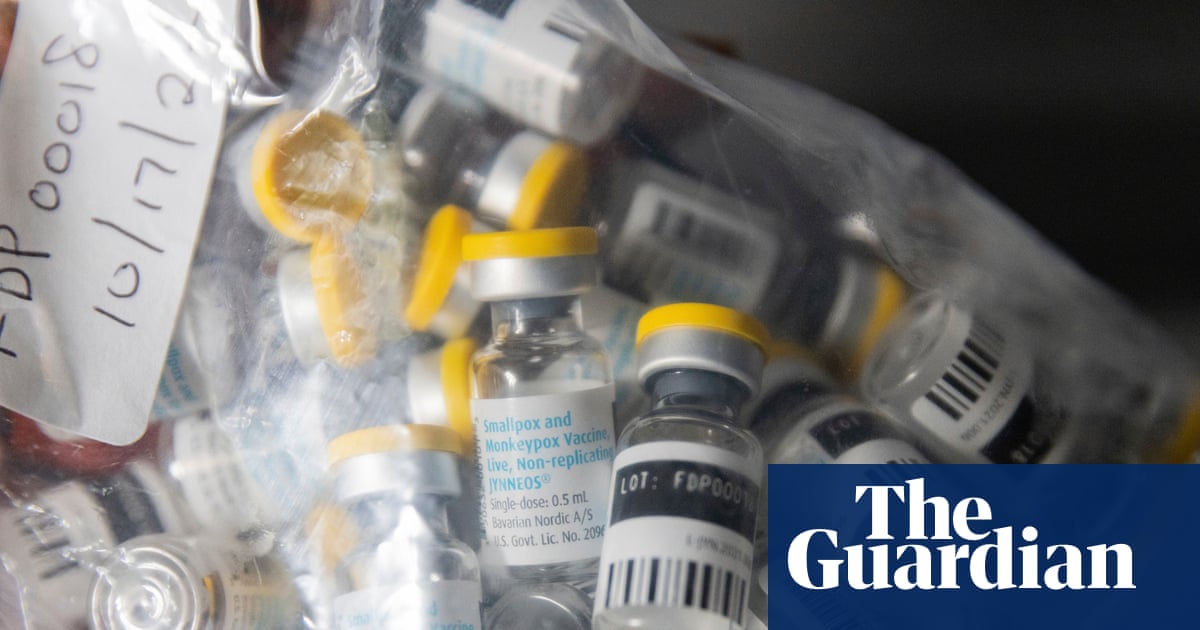
A newer variant of mpox, the virus formerly known as monkeypox, is now spreading through some communities in the US and Europe.
The risk to the general public is low, but community transmission in new places signals greater challenges for public health to detect cases and stop the spread.
In October, California announced three cases of the newer variant, known as clade Ib. All three of the patients – two in Los Angeles and one in Long Beach – were hospitalized and are now recovering.
None of the patients had apparent links to each other and none had traveled internationally recently, indicating the virus is likely spreading undetected in some communities. There have been six cases of the new mpox variant found among travelers in the US, but this is the first sign of community spread.
The news comes as several European countries – Spain, Italy, the Netherlands and Portugal – also report apparent community transmission of the newer variant, and the older variant continues to circulate globally.
There have been more than 44,000 cases of mpox reported so far in 2025, according to the World Health Organization. That’s more than the total reported in 2024.
The three cases in California appear may be linked genomically and may trace back to a travel case from August, according to the American Hospital Association. The industry group said this information was released by the US Centers for Disease Control and Prevention (CDC) in an advisory on Wednesday, although that advisory does not appear to be available publicly.
The US Department of Health and Human Services did not respond by press time to the Guardian’s media inquiry about potential genomic links between the cases and whether the virus appeared to be spreading in specific networks.
“Given that the three cases in Los Angeles were all hospitalized, that lends a little bit more credence to the idea that maybe there is local transmission going on,” said Miguel Paredes, a genomic epidemiologist at the University of Washington.
In Los Angeles, about one in 33 cases of the older mpox variant is currently being detected, according to an October study, co-authored by Paredes, which has not been peer-reviewed or published.
“If you’re thinking about a 3% case fatality rate, and we’re capturing the ones that are ‘more severe’, then we’re not really capturing the ones that are potentially less severe,” he said.
Vaccination may also complicate the picture.
“Vaccines are doing a good job of sometimes preventing infection but also creating less severe disease, which is good on an individual’s side. But it also makes passive surveillance a little difficult, because if you have less severe disease, you’re less likely to seek treatment or actually think you have mpox,” Paredes said.
That means researchers and officials need to be more proactive about finding and monitoring cases, not just recording the cases of people who seek care, he said. Wastewater sampling would be one relatively inexpensive and unobtrusive way to monitor spread, he added.
In 2022, cases of the clade IIb mpox variant exploded internationally, infecting nearly 100,000 people around the world. About a third of the detected cases were in the US. The vast majority of those cases were among men who have sex with men.
Yet the new variant, which appears to have emerged in mid-2023 and was first detected in the Democratic Republic of the Congo, has not shown the same pattern. It has infected men and women, usually between the ages of 25 and 40, at roughly the same rate.
The outbreak in central and eastern Africa has spread through what Jason Kindrachuk calls “dense sexual networks”, or people with multiple sexual partners.
“It’s a big piece of it,” said Kindrachuk, who is an international expert on mpox and vice president of the National Microbiology Laboratory branch of the Public Health Agency of Canada.
“Dense sexual networks increased risk transmission generally. Regardless if you’re male or female, you had an increased probability or increased risk of getting infected if you were within those networks.”
But it’s difficult to know if the same pattern would continue in other countries, he said. “Trying to make assessments of what is going to happen in other regions of the world when you are looking at DRC or central Africa in general is very difficult.”
There have only been a few community cases of the new variant detected internationally, so it’s not possible yet to make broad statements about the kinds of networks where it is spreading, Kindrachuk said.
California has not released information about the gender or the sexuality of the patients. But the press release indicated the newer variant was “primarily impacting communities of gay and bisexual men, and other men who have sex with men, as well as their social networks”.
People are at higher risk for mpox if they are gay, bisexual, or a man who has sex with men, or are transgender or nonbinary, and have had more than one partner in the past six months, according to the CDC.
People are also at risk if they have recently visited a sex venue, such as a sex club or bathhouse, or recently had sex at large events in places where mpox is spreading, the CDC notes. Mpox spreads through close skin-to-skin contact, which makes sexual contact a major mode of transmission.
The Trump administration has gutted international aid and development work, making it much more difficult to monitor and contain outbreaks like these. Officials in the US are focusing on vaccinating people who are at risk – some of whom may only have received the first of a two-part vaccine
“I always want to encourage people to get vaccinated,” Paredes said. “It’s like a small thing that can go a long way in protecting you.”
Vaccines are more accessible when they are provided by the government rather than through private insurance, especially among low-resource communities, Paredes said. It also helps to offer shots outside of working hours and at easy-to-reach locations.
It may be more challenging to employ the same techniques that worked before to curb mpox. The US government is largely shut down, and the CDC has lost about a third of its staff this year due to layoffs and resignations.
Many of the public health networks used during the 2022 outbreak – STI and HIV monitoring, for example – have been on the chopping block under the second Trump administration.
Communities affected by mpox may once again take the lead fighting against this virus.
In 2022, organizations and members of the queer community worked together with officials to offer testing and vaccines, including at gatherings where people may be having intimate contact like sex.
“Really, we benefited from community-based organizations providing information and going out and trying to reduce that stigma,” Kindrachuk said. He also voiced appreciation for members of the affected communities for “empowering individuals to feel comfortable with moving forward for testing and to be able to identify risks and potential infections as well”.
Disclaimer : This story is auto aggregated by a computer programme and has not been created or edited by DOWNTHENEWS. Publisher: theguardian.com








